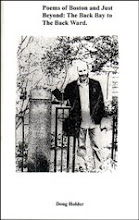New Repertory Theatre and
Boston Center for American Performance
Boston Center for American Performance
Reviewed by Lawrence Kessenich
There are just six performances left of Pattern of Life—all happening this week, from Wednesday June 25
through Sunday, June 29—but if you can get to one of them, go! You will be
rewarded with a powerful and thought-provoking dramatic experience. Tickets are
available at http://www.bostontheatrescene.com/season/Pattern-of-Life/.
There are just two characters in the play, Rahmat, a Pashtun
villager in Pakistan, played by Nael Nacer, and Carlo, an American serviceman
who helps guide “drones” to their targets in Pakistan, played by Lewis D. Wheeler. Both characters address the
audience passionately throughout the play, only directly interacting with one
another in two well-modulated dream sequences, though they occasionally “see”
each other in other ways. Being directly addressed consistently gives the play
an immediacy for the audience that makes it hard to look away.
Nacer is one of my favorite actors in Boston, equally capable
of being terribly menacing and deeply vulnerable, though the menacing demeanor
only makes brief appearances in this play. Wheeler portrays Carlo as a “regular
guy” who just does his job and believably shows the transition to a man
confused by things he’s never had to think about before.
As you might imagine, it is to Rahmat’s village that Carlo
guides his drones—or Remotely Piloted Aircraft (RPA), as he insists they must
be called. Something happens in the initial attack that profoundly shakes both
Rahmat’s and Carlo’s worlds, even though those worlds are thousands of miles
apart—because the RPA is guided to its target from an Air Force trailer in the
Southwest U.S.
Up until this event occurs, Rahmat has stayed clear of the
radicals who visit his village, and who burned down the school where he taught,
while his brother Atsak gets more deeply involved with them. Rahmat only remains
in the village for the sake of Atsak and Atsak’s son, Rahmat’s nephew, Marjan.
He would rather go “down the road” to a town where there are jobs and hope. But
the results of the drone attack change all that, and Rahmat is adopted by the
radicals as an example of why the people of the village must fight back.
Ultimately, being in this position forces Rahmat to confront his life and
discover what is truly meaningful to him.
Carlo, who has managed to not only rationalize his work with
guiding RPAs, but to take pride in what that work has done to protect his
fellow servicemen, is suddenly forced to face the sometimes evil consequences
of his work. Not being a psychologically oriented man, he is thrown completely
off balance by this experience and acts out in ways that only cause him more
trouble. Vanessa, his partner in the RPA work, pregnant with her second child,
who he had previously dismissed as cold and disinterested, turns out to the one
who helps him begin to work through what has happened.
Both Nacer and Wheeler portray their characters with
absolute conviction and make them psychologically true. It doesn’t hurt that author
Walter McGough has given them great material to work with. You can’t help
caring for both of these men, nor can you avoid being appalled by the brutal
nature of a war conducted by remote control. McGough raises issues that are as
fresh as today’s headlines and as old as the human race. It’s not every day
that you have the privilege of seeing a play that manages to do both of these
things effectively. Take advantage of this opportunity.

































No comments:
Post a Comment